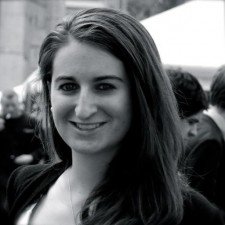 Kathy Cheng is used to walkable cities. She grew up near New York and went to college in Cambridge, Mass. Now she finds herself driving in the Motor City, as a Venture for America (VFA) fellow working at a startup in downtown Detroit. Cheng talked to Techonomy about the VFA program, adapting to Detroit, and helping the city thrive.
Kathy Cheng is used to walkable cities. She grew up near New York and went to college in Cambridge, Mass. Now she finds herself driving in the Motor City, as a Venture for America (VFA) fellow working at a startup in downtown Detroit. Cheng talked to Techonomy about the VFA program, adapting to Detroit, and helping the city thrive.
How did you find out about Venture for America?
I heard about VFA when I was an intern at the U.S. Small Business Administration. My supervisor invited me to sit in on a call with Andrew Yang, the VFA founder. I heard his entire spiel, and initially thought the program was cool but not necessarily for me; as an MIT student I thought entrepreneurship only applied to technology and computer engineering majors.
When Andrew came to M.I.T. two months later to talk about the program, we ended up having a good conversation. He addressed all of my concerns. I realized that VFA is focused on entrepreneurship, not coding, and fellows can do anything from sales to business to marketing. It clicked that this could be a program for me.
My background is in urban planning and economics. When I graduated from M.I.T., I wanted to do something that combined business, technology, and creativity.
How does your job at Doodle Home, an online platform for interior designers, fit those skills?
Doodle Home’s mission is to empower interior designers to design instead of being bogged down by running a business. When designers come up with ideas, they go through this very laborious process of quoting and ordering furniture. Doodle Home handles all of those messy business elements: calling up different manufacturers, getting price quotes, and tracking orders.
My official title is Business Analyst, but I play a product manager role, making sure that the different teams—the creatives, the technology people, the leadership team—come together and create a product.
The VFA experience is definitely different from a typical first job experience because of the exposure I get to everything that goes on in the company. I learned so much in the first six months. The leadership here is incredibly receptive to my suggestions and my ideas, which is empowering.
How did your perception of Detroit change when you moved there?
When Doodle Home flew me out to Detroit for an interview, I walked around and realized that the city isn’t nearly as bad as everyone says. There was a Tigers game that day, it was beautiful out, and it didn’t seem that different from the Fenway experience in Boston. I was both intrigued and a little saddened by all the buildings and the energy, and I thought I could see myself living here for two years.
I came into Detroit having heard a lot about its downsides. The city has very real problems. But I’ve found living in downtown to be pretty safe, and there’s so much energy. I think Detroit’s biggest asset is its people. People are here for a reason; it’s not a default city for college grads. It’s unbelievable to be surrounded by people who feel like they have a stake in the future of the city and proactively care.
In Detroit there are a lot of things going on under the surface that you don’t quite expect. There’s lots of artistic talent in the city, lots of people hosting events or helping the city in some way. I find the energy really refreshing.
But, even though there are these great spurts of activities, there isn’t an overarching plan. The city needs to strategically bring these developments together; instead of creating a microblock here and, 10 minutes later, a microblock there, they need to connect these experiences.
Will you stay in Detroit after the two-year VFA program ends?
I would like to stay in Detroit for a little bit after my fellowship. There’s so much to learn from the city. It’s a city of hustlers, of people who worked in broken scenarios and circumstances and still made things happen. It feels like a cool playground for interesting ideas. I’d like to explore Detroit’s opportunities for a little while longer; I might even consider doing something on my own here.
For Detroit, it’s all about how we move forward from the bankruptcy, because there is a lot of potential for this to be something that’s good for the city in the long run. Can we get out of this in one piece? Can we become stronger because of it? In Detroit you have to walk a nuanced line. People get upset if the media talks about how Detroit is a terrible place, but they also get upset if the media skews really positive by highlighting the startup scene. There are still very real problems here, but there is real hope, and it’s all about how we navigate. It’s very similar to the business world: how you execute and how you follow through matters.
Venture for America CEO Andrew Yang will speak at the Sept. 17 Techonomy Detroit event.
Navigating Detroit: A VFA Fellow Discovers Ideas, Energy, Opportunity
Kathy Cheng is used to walkable cities. She grew up near New York and went to college in Cambridge, Mass. Now she finds herself driving in the Motor City, as a Venture for America (VFA) fellow working at a startup in downtown Detroit. Cheng talked to Techonomy about the VFA program, adapting to Detroit, and helping the city thrive.















